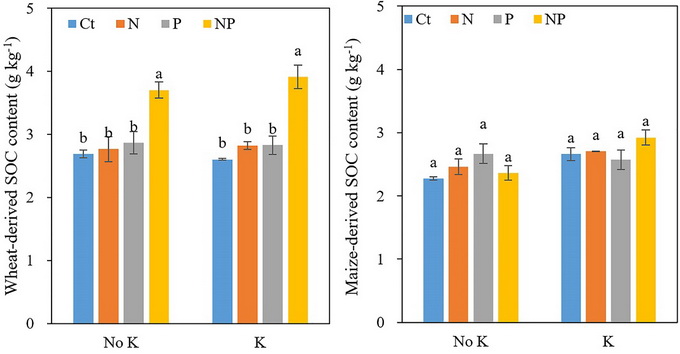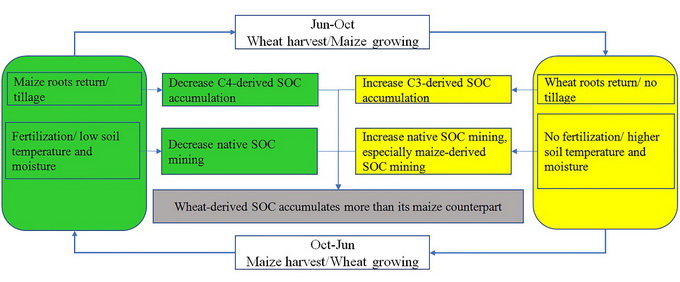Soil organic matter plays an important role in the quality of cultivated land. It is not only involved in the construction of soil physical structure, but also an important source of soil nutrients. How to improve the content of soil organic matter has always been a hot topic in soil science. Fertilization is the most common way to supply nutrients to the soil and to maintain crop productivity in agricultural ecosystems, which may also influence soil organic carbon (SOC) accumulation rates. In 1996, we set up a long-term field experiment to explore the effect of fertilization on soil properties in a winter wheat-summer maize cropping system in the North China Plain. Eight treatments include no fertilization (Ct), nitrogen (N), phosphorus (P) and N combined with P (NP) fertilizer application with or without potassium (K). After 21 years of fertilization, N application did not increase soil total N content, but P application significantly increased soil total P contents by 33.9%. The single application of N or P did not significantly affect SOC content, while the NP combination significantly increased SOC contents by 22.1% and 29.6% compared to Ct in the no K and K treatments, respectively. The natural 13C abundance approach and the SOC contents suggested that the NP combination increased C3 wheat-derived SOC by 37.5% and 49.8% in the no K and K treatments; however, fertilization had no impact on C4 maize-derived SOC content. Wheat-derived SOC was positively correlated to the wheat yield, while maize-derived SOC was not correlated to the maize yield, which indicated that wheat-derived SOC accumulated more than maize-derived SOC in the wheat-maize cropping system. In addition, soil inorganic carbon (SIC) and its compositions were not affected by the long-term fertilization. Our results indicate that N combined with P application is more beneficial than N or P alone to enlarge SOC sequestration, especially for wheat-derived SOC. Thus, in soil with nutrient limitations, the nutrient resources should be supplied with a priority to the wheat growing season in wheat-maize cropping systems, to maintain or enlarge soil C storage.


This work was supported by the National Key Research and Development Program of China (2016YFD0300305), Major Project of Chinese Academy of Science (KFZD-SW-112) and National Key Research and Development Program of China (2018YFD0300504).
Website: Https://doi.org/10.1111/ejss.12900